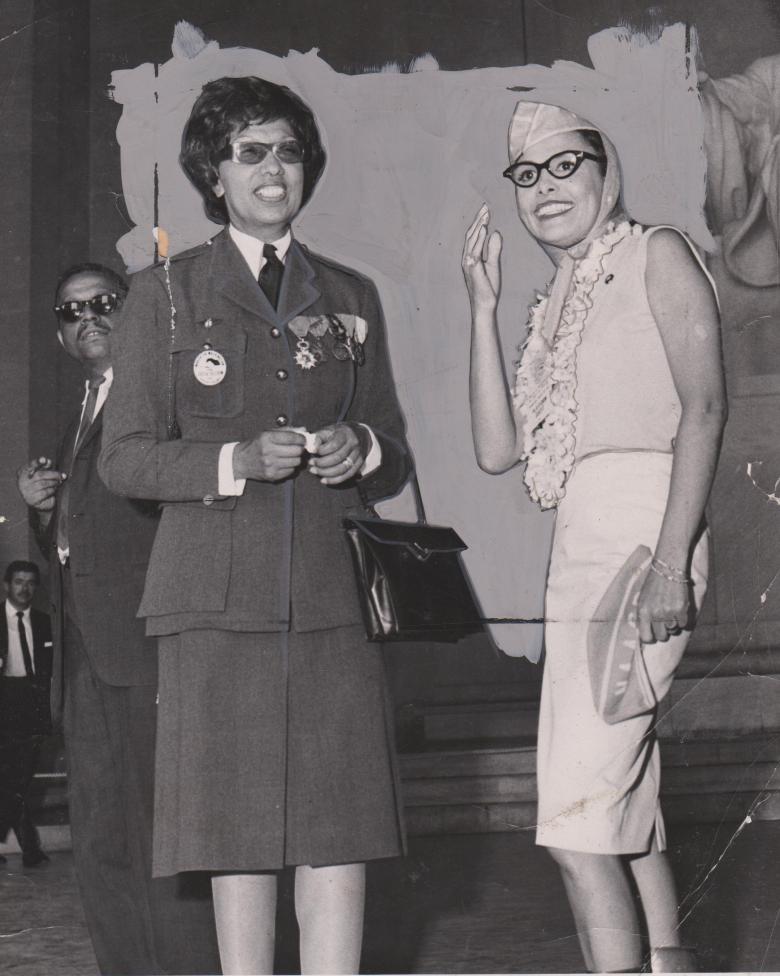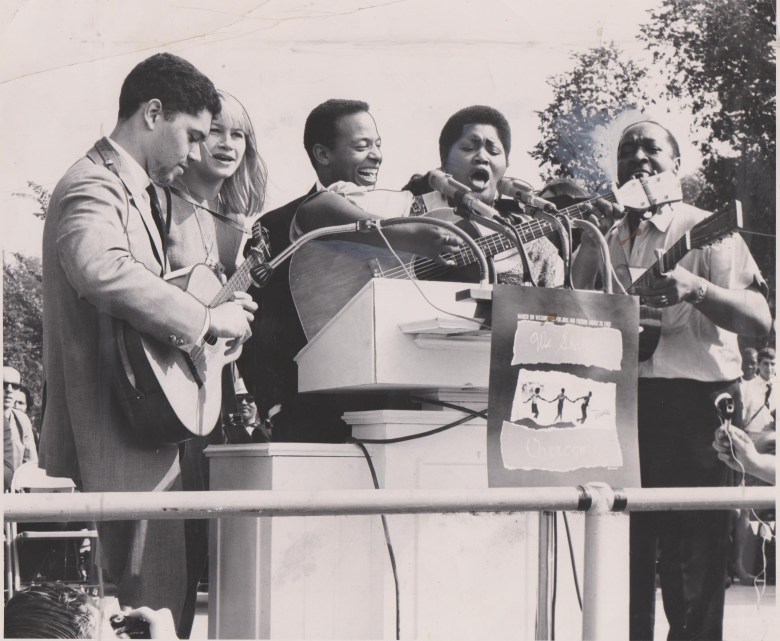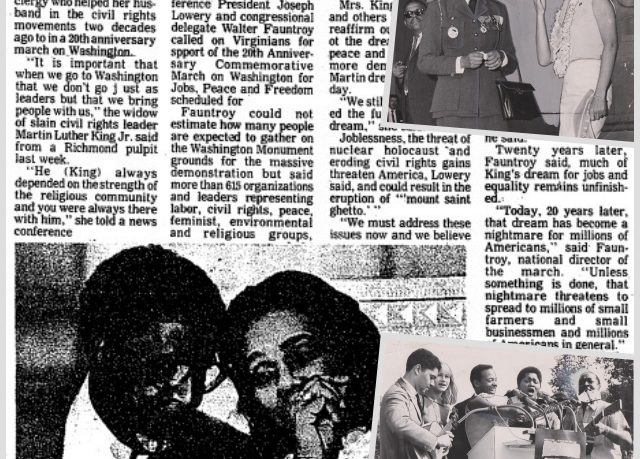Women civil rights leaders are gearing up for the 2023 March on Washington and reflect on the role of female activists sixty years ago. In addition to coverage of the original march, the AFRO has also covered anniversary marches, like the 20th anniversary in 1983.
By Helen Bezuneh,
Special to the AFRO
When looking back at photos from the 1963 March on Washington, one can see the movement’s dark-suited male leaders standing hand in hand on the frontlines of the crowd, ambitiously leading a mass of about 250,000 people down the National Mall. Though a movingly evocative image to many, an untrained eye may be oblivious to a particular aspect of the photo: the march’s women leaders, who had equally involved roles in making the event happen, stand rows behind the male leaders, separated from the likes of Martin Luther King Jr.
Though women played key roles in the march and the larger Civil Rights Movement, the men preferred to bar women from the realm of public leadership. At this year’s March on Washington, however, women will stand at the forefront of the march, representing the efforts of many unrecognized women civil rights leaders over the decades.
“The good thing about this year’s march is that we are in a different time and the role of black women in politics in general has become a major force,” said Shavon Arline-Bradley, president of the National Council of Negro Women (NCNW), an organization that will co-chair the 2023 march. “Black women right now are the most consistent voting block and black women’s voices are now more consistent than ever before.”
The National Action Network is gearing up to host the 60th anniversary of the March on Washington on August 26, which they call a “continuation”, not a “commemoration” of the 1963 march. This year’s milestone event will place special emphasis on the pressing issue of hate crimes. According to the Federal Bureau of Investigation, the percentage of reported hate crime incidents increased 11.6% from 2020 to 2021. 63.1% of single-bias incidents were motivated by bias towards race, ethnicity, or ancestry.
“Discrimination is not a thing of the past, it remains an issue in the present,” said Jonathan Greenblatt, CEO of the Anti-Defamation League, an organization partnering with NAN for the 2023 march. “Because there are challenges to our equality, not just that we read about in the history books, but that we read about in the newspapers today. I think this fight is an ongoing fight and we’re proud to be playing even a teeny tiny role in advocating for it.”
Arndrea Waters King, President of the Drum Major Institute (DMI), will lead this year’s march alongside her husband Martin Luther King III, Board Chairman of the DMI, and Reverend Al Sharpton, President and Founder of NAN.
Waters King has studied hate crimes and hate groups for multiple years, helping organize marches and rallies related to the cause. She had a huge hand in mobilizing the Georgia Hate Crimes Act and supported the creation of the Southern Coalition Against Racism and Bigotry.
While Waters King will receive recognition for her work against hate crimes at this year’s march, the same could not be said for women leaders at the 1963 March.
 Josephine Baker, at the age of 57, flew from France to perform at the March on Washington in front of 250,000 people. Entertainer Lena Horne, 46, also used art as activism by singing “Freedom” at the 1963 March. (AFRO Archives)
Josephine Baker, at the age of 57, flew from France to perform at the March on Washington in front of 250,000 people. Entertainer Lena Horne, 46, also used art as activism by singing “Freedom” at the 1963 March. (AFRO Archives)
Dorothy Height, then-president of the National Council of Negro Women, was a key organizer in the making of the march, but was virtually unknown by many. She helped gather thousands of women volunteers who aided in promoting the rally, contributing to the sheer amount of attendees at the event.
“The NCNW was the group that really represented the interests of women,” said Arline-Bradley. “At the time, [Height] was really behind the scenes, making sure things worked out, making sure there was a presence of young people. Although she did not speak at the march, she was one of the most efficient voices and architects of it.”
Anna Arnold Hedgeman, who worked for the National Council of Churches, was the only woman on the organizing committee for the march. She recruited more than 40,000 Protestants to participate in the event.
Prior to the march, Height and Hedgeman expressed concern that no women were scheduled to speak at the momentous event. They argued for a female speaker, but the male leadership remained largely unmoved. To compromise, they added a short “tribute to Negro women” on the program, which originally was intended to be delivered by a man.
Hedgeman implored them to let a woman speak, so they scheduled Myrlie Evers, civil rights activist and journalist, to deliver the tribute instead. Evers was ultimately unable to make it, so Daisy Bates, Arkansas NAACP director and Little Rock Central High School desegregation leader, took her place.
The event’s performers were the only other women who had the chance to step in front of the microphone.
“So many women were the driving forces of the movements, but weren’t recognized,” said Christian Nunes, president of the National Organization for Women (NOW), a group partnering with NAN for the 2023 march. “So many…were standing in the front lines protecting these men and no one ever talks about them.”
“They took the blows, they took the hits, they were arrested,” she continued. “It’s time that we uplift their voices.”
NOW is currently preparing volunteers for the march, ensuring that their organization is active in the event. Founded in 1966, NOW emerged in the midst of the Civil Rights Movement.
 Leon Bibbs, Mary Travers of the Peter, Paul and Mary Trio, Lonnie Sattin, Odetta and Josh White use music to present a united message as it relates to jobs and freedom. (AFRO Archives)
Leon Bibbs, Mary Travers of the Peter, Paul and Mary Trio, Lonnie Sattin, Odetta and Josh White use music to present a united message as it relates to jobs and freedom. (AFRO Archives)
“It was founded at a time when…activism for women’s rights wasn’t really represented,” said Christian Nunes, president of NOW. “It’s important for NOW to come and speak out about the importance of us being in solidarity about all of the issues, and represent unsung women who really didn’t get a chance to be represented in the [1963] March on Washington.”
At this year’s march, attendees will hear a “diverse set of voices” noted Arline-Bradley. The NCNW will speak at the event, representing their long lineage of women civil rights leaders.
“Our council is planning on hosting a webinar to prepare for the March,” said Arline-Bradley. “We are going to be bringing in council members from across the country, they’re gonna be joining us. Our goal is to get as many black women in there as possible. We are preparing to ensure we…are able to send a message that civil rights organizations are unified on this march.”
On Instagram, Rev. Sharpton recently posted a photo of him and Ebonie Riley, the NAN’s Washington, D.C. Bureau Chief, having a meeting about the 2023 March, suggesting that Riley is a key organizer this year. She led the 50th anniversary of the March, the 2021 March on Washington for Voting Rights and the 2020 Commitment March on Washington.
The highest ranking woman in the organization’s history, Riley works to advocate for and influence Federal public policy, advocating for economic and social equality within the communities she serves.
Considering the theme of this year’s march, Nunes says it’s critical to not only highlight women leaders, but also women, and especially black trans women, who are frequent victims of hate crimes.
“I think sometimes people forget that women are individuals who are burdened by so many crimes, even hate crimes,” said Nunes. “Let’s talk about what this really is, let’s talk about the missing and murdered black women in this country who are not getting attention in the media”
“We have to as a country push back on that, call it out and work together,” Nunes said, “to work against and dismantle systems of oppression and institutionalized racism.”
Help us Continue to tell OUR Story and join the AFRO family as a member –subscribers are now members! Join here!



